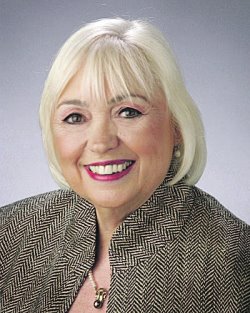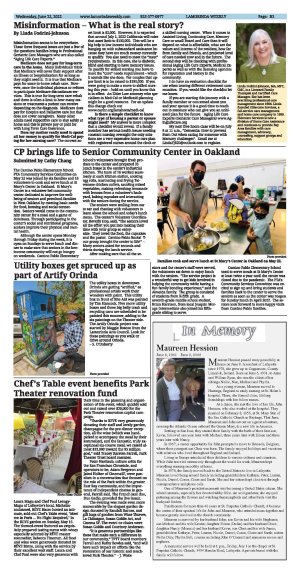| | Published June 22nd, 2022
| Misinformation - What is the real story?
| | | By Linda Fodrini-Johnson |  | | Linda Fodrini-Johnson, MA, MFT, CMC, is a Licensed Family Therapist and Certified Care Manager. She has been practicing professional care management since 1984. Linda founded Eldercare Services, a full-service care management and home care company in 1989. Eldercare Services is now a division of Home Care Assistance and continues to provide Bay Area families with care management, advocacy, counseling, support groups and education. |
Misinformation seems to be everywhere. These three frequent issues are just a few of the questions families bring to Professional Geriatric Care Managers who are also called "Aging Life Care Experts."
 Medicare does not pay for long-term care in the home. Many individuals think that Medicare will cover their support after an illness or hospitalization for as long as they might need it. It is true that Medicare pays for some in-home rehab care. However, once the individual plateaus or refuses to participate Medicare discontinues services. This is true for long-term care rehab and there is often a limit to how many sessions or treatments a patient can receive depending on the diagnosis. Medicare does pay for Hospice and Palliative care but that does not cover caregivers. Many older adults need supportive care to stay safely at home and this is private pay or paid for with Long Term Care Insurance.
Medicare does not pay for long-term care in the home. Many individuals think that Medicare will cover their support after an illness or hospitalization for as long as they might need it. It is true that Medicare pays for some in-home rehab care. However, once the individual plateaus or refuses to participate Medicare discontinues services. This is true for long-term care rehab and there is often a limit to how many sessions or treatments a patient can receive depending on the diagnosis. Medicare does pay for Hospice and Palliative care but that does not cover caregivers. Many older adults need supportive care to stay safely at home and this is private pay or paid for with Long Term Care Insurance.
 Does my mother really need to spend all her money to qualify for Medi-Cal paying for her nursing care? The current asset limit is $2,000. However, it is expected that around July 1, 2022 California will raise that asset limit to $130,000. This will be a big help to low income individuals who are hanging on with substandard assistance because they have too much money currently to qualify. You also need to meet the "meet" requirements. In this case, she is diabetic, blind and starting to have memory issues. To qualify for skilled nursing you have to meet the "care" needs requirement - which it sounds like she does. For couples that upper limit is to be raised to $195,000. If you were going to make a move to skilled nursing this year - hold on until you know this is in effect. An Elder Law attorney who specializes in Med-Cal or Medicaid planning might be a good resource. For an update this change check out www.canhr.org/factsheets/medi-cal
Does my mother really need to spend all her money to qualify for Medi-Cal paying for her nursing care? The current asset limit is $2,000. However, it is expected that around July 1, 2022 California will raise that asset limit to $130,000. This will be a big help to low income individuals who are hanging on with substandard assistance because they have too much money currently to qualify. You also need to meet the "meet" requirements. In this case, she is diabetic, blind and starting to have memory issues. To qualify for skilled nursing you have to meet the "care" needs requirement - which it sounds like she does. For couples that upper limit is to be raised to $195,000. If you were going to make a move to skilled nursing this year - hold on until you know this is in effect. An Elder Law attorney who specializes in Med-Cal or Medicaid planning might be a good resource. For an update this change check out www.canhr.org/factsheets/medi-cal
 Is there a simple checklist to know what type of housing a parent or spouse might need? My answer is more complex that a checklist would reveal. If a family member has serious health issues needing constant nursing oversight the only solutions are a very expensive home care plan with registered nurses around the clock or a skilled nursing center. When it comes to Assisted Living, Continuing Care, Memory Care or small Board and Care then it will depend on what is affordable, what are the values and interest of the resident, how far from family and friends, and projected level of care needed now and in the future. The second step will be checking with professional (Aging Life Care Experts, Medical Experts) as well as with the licensing agencies for reputation and history in the community.
Is there a simple checklist to know what type of housing a parent or spouse might need? My answer is more complex that a checklist would reveal. If a family member has serious health issues needing constant nursing oversight the only solutions are a very expensive home care plan with registered nurses around the clock or a skilled nursing center. When it comes to Assisted Living, Continuing Care, Memory Care or small Board and Care then it will depend on what is affordable, what are the values and interest of the resident, how far from family and friends, and projected level of care needed now and in the future. The second step will be checking with professional (Aging Life Care Experts, Medical Experts) as well as with the licensing agencies for reputation and history in the community.
 I do have an evaluation checklist for use when touring different retirement communities. If you would like the checklist let me know.
I do have an evaluation checklist for use when touring different retirement communities. If you would like the checklist let me know.
 If you are starting this journey with a family member or concerned about you and your spouse it is a good time to reach out to someone who can give you an unbiased plan for the future. Aging Life Care Experts (Geriatric Care Managers) www.AgingLifeCare.org
If you are starting this journey with a family member or concerned about you and your spouse it is a good time to reach out to someone who can give you an unbiased plan for the future. Aging Life Care Experts (Geriatric Care Managers) www.AgingLifeCare.org
 My next free Zoom class will be on July 8 at 11 a.m., "Dementia: How to prevent Burn Out when caring for someone with Memory challenges". Email me at LindaFJ620@outlook.com to register.
My next free Zoom class will be on July 8 at 11 a.m., "Dementia: How to prevent Burn Out when caring for someone with Memory challenges". Email me at LindaFJ620@outlook.com to register. |
| | | | | | | | | | | | |



